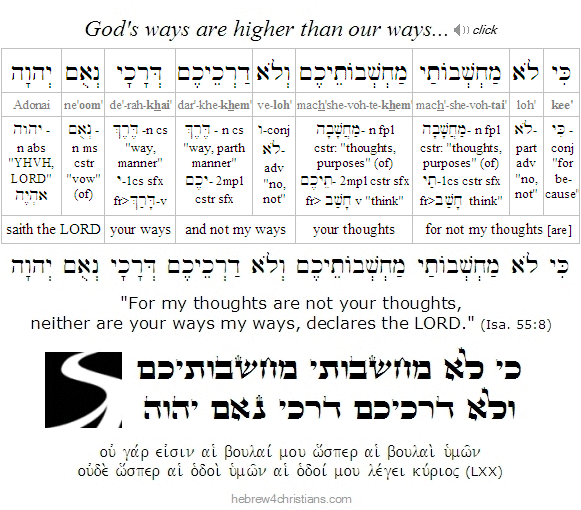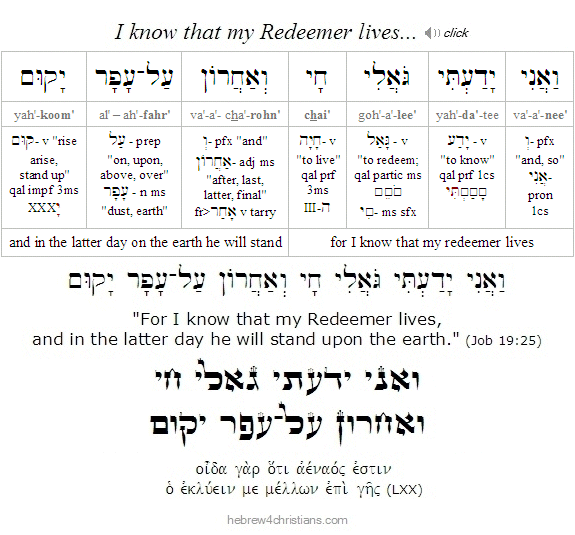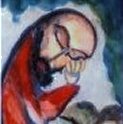|
Regarding the "language of pain," the Talmud discusses how the bleeding of a stubbed toe corrects the relationship between man and God as if it were an "olah sacrifice" (whole burnt offering). They elaborate that this would be the case if it was the second time the toe was injured before recovering from its first injury, and that it had occurred on the right toe when the person was on a mission to fulfill a mitzvah (commandment).
The reference to the right toe recalls the anointing of the priest for service (Exod. 29:20) as well as the healing of a leper (Lev. 14:25). The sages note that this signification of the blood is not the result of a punitive measure but instead indicates a wound that brings the heart closer to God. In the case of an injury to the toe while doing a mitzvah, the sufferer is brought to teshuvah (repentance), not because of disobedience, but in order to learn compassion, and to affirm that everything comes only from the Lord (Psalm 136:25-26). "Let this suffering be for atonement," by which is meant, may this too bring my heart closer to God's love... The sages brought this case up as a counterexample to the notion that all suffering or pain is some form of punishment from heaven, and argue that on the contrary, some suffering is the result of God's decree. This is the message of the Book of Job as well.
A pain-free life is not necessarily a sign of blessing, of course, since it might indicate that the person is no longer being "educated for eternity," and therefore that God no longer talks to him anymore. This is one way to understand the irony of why the wicked prosper in this world, for they shall have received their reward here, but nothing in the world to come (Matt. 6:5; Job 27:8). On the other hand, pain can "goad" the soul to draw near to God for healing, which is the essential and consummate blessing, after all... Pain also teaches us to be humble, to consider our own frailty and need, and to learn compassion by extending that consciousness to people as well. The greatest example of this is found in our Savior, who emptied himself and suffered in wholehearted service to his heavenly Father (see Isa. 50:6; Phil. 2:7-8; Heb. 2:10, 4:15; 5:8-9. 7:25, etc.).
The spiritual life is not about finding comfort through fulfilling our worldly desires as much as it is devotion to the truth by exercising faith in the divine ideal. We come to God to conform to his will, not because religion (or spirituality) is a form of therapy or another self-improvement project. Stoicism has made a come-back in the "postmodern" world, offering people a variety of philosophical diversions and excuses meant to diminish the significance of what happens in this world and to direct the mind to a "nirvana-like" equanimity (ataraxia), as if the final reconciliation has already taken place. Such detachment from the world, however, is incompatible with faith in God's omnipotence and love, since it assumes that this age is not meaningful or offers no blessing. Genuine faith in God allows us to mourn when sorrow is called for and to rejoice in times of joy; it does not negate the reality of history nor deny God's providential love in the temporal realm. This is part of the tension we have in a "two-tiered" reality, which requires us to both affirm the reality of life in this world - the mixed bag of sorrows and joys we experience in our sojourn - and the promise of the substance to come, when all tears will be wiped from our eyes and our love will be unhindered by sin... The tension is dialectical and complex: we stand in relation to God not only when we are confronted by his truth, but in our seeking and in the ordinary ups and downs of our everyday existence. As C.S. Lewis said, those who choose a life of truth over happiness often acquire both, whereas those who seek happiness over truth often acquire neither... Therefore as we walk with God, whether in the high places or in the shadow of death, we experience blessing and grace in our lives.
The temptation behind suffering is to regard it as a sign of divine rejection or abandonment. Even when suffering is interpreted to be an invitation to do teshuvah, however, it does not unambiguously indicate where we stand in relation to God... This is true even in light of the work of salvation secured in Yeshua at the cross. Is our suffering a means of correction or "chastening" (Psalm 94; 119:71)? Or is it the result of the common affliction our fallen human nature (Gen. 3:17-19; Job 5:7; 14:1; Rom. 8:20)? Or is our suffering somehow for the sake of the glory of God (John 9:1-3, Matt. 5:11-12)? The writers of the New Testament repeatedly mention fiery trials and tests that would befall God's children (1 Pet. 4:12-13; Rom. 8:17; Phil. 3:10; Matt. 5:11-12; Col. 1:24; 2 Tim. 2:12).
Some have said that this ambiguity makes teshuvah impossible, for you can't repent unless you know what you have done wrong... This raises the question of how much we are able to know of ourselves and our "secret sins," and how these affect us spiritually. "The heart is deceitful above all things, and incurably sick-- who can know it" (Jer. 17:9). The heart is the source of the problem (Mark 7:21) and yet how is it possible to overcome itself? In other words, how can a person be saved from himself, after all? If we are incurably sick, healing must come from a source outside of ourselves... by means of the miracle of regeneration.
We do not relate to God in terms of the "law" but rather in personal terms, by having faith in God's love and grace given in Yeshua (Heb. 4:15-16). The problem of our sin therefore goes beyond "forensic judgment" to that of relationship... Instead of reciting a litany of our sins against heaven, we reach out for connection, for God's mercy and touch, even if we are in darkness about what went wrong or how we lost our way. How have I broken my connection with the Lord? How have I allowed myself to harden and thereby become lost to my true heart? How have I misunderstood? How have I been blind? How have I doubted God's love for me? To "renew our days as of old" we must first understand our need for renewal - for our need to "return to our first love." We return to the Lord in trust that his love is all we need, and that he welcomes us with blessing (Luke 15:11-32).
As Kierkegaard explained, the "self" is really an inner dialog within the heart (a "relation which relates itself to itself"), that is, a self-transcendent relation that witnesses the inner dialog, though we cannot have a true "self" apart from a relationship with what Buber called an "I-Thou" connection. These two relationships are eternal - the one we have with ourselves, and the one we have with God who is the ground of our existence, and therefore we cannot really exist with ourselves apart from having a right relationship with God who establishes who we are. Paradoxically, if all we have is ourselves, we do not have a self at all, and those who seek to have a self must first lose themselves to find themselves.
God's thoughts are not our thoughts nor are our ways his ways (Isa. 55:8), and there is no "recipe" or "formula" to know Him apart from the messy business of struggling within our hearts, seeking and finding, and seeking again, lamenting and praising, and then lamenting again, by living out our evanescent lives in the depths of our needs and our dearest hopes. In times of incomprehensible suffering, a heart connection with God can indeed be quite unsettling, but we must press through the fear, we must "see through the glass darkly" and confess that "God is with us" - even in the midst of this trouble. Faith apprehends God's heart before all else - it trusts that there is unseen good that transcends and constrains the travail of the present hour. Our father Jacob was renamed "Israel" when he surrendered to God's Presence despite everything wrong he had ever done...
 |
Faith not only affirms that God is with us in the present, however, but in the pain of our past as well. In response to the intellectual question, "Where was God in times of our sorrow, our abandonment, our nightmare?" Faith answers: "He was with us." But faith not only affirms that God was with us in the harrowing past but will be with us in the future, in the substance of our yearning for deliverance and for life. Faith "remembers the future" by holding to the promise of God, even in the wake of the past and in the ambiguity of the present...
God is involved in all our sorrows because of his greatness, and his pathos knows when "the flower fadeth and when the sparrow doth fall." As David said: "telleth our wanderings, he collects our tears and stores them in his bottle; the story is written in his book" (Psalm 56:8). The heart of the Lord spans "the breadth and length and height and depth" Messiah, a love that surpasses knowledge (Eph. 3:17-19). "It is higher than heaven-- what can you do? Deeper than Sheol -- what can you know?" (Job 11:8). Despite the sorrows and anguish we sometimes experience in this life, we trust that God will fulfill his promises to us and perfect our salvation at the appointed time. Our exile will then be over and then we will experience the consummate glories and wonders of heaven itself.
 |
"Father in Heaven! You have loved us first, help us never to forget that You are love so that this sure conviction might triumph in our hearts over the seduction of the world, over the inquietude of the soul, over the anxiety for the future, over the fright of the past, over the distress of the moment. But grant also that this conviction might discipline our soul so that our heart might remain faithful and sincere in the love which we bear to all those whom You have commanded us to love as we love ourselves.
You have loved us first, O God, alas! We speak of it in terms of history as if You have only loved us first but a single time, rather than that without ceasing You have loved us first many times and every day and our whole life through. When we wake up in the morning and turn our soul toward You - You are the first - You have loved us first; if I rise at dawn and at the same second turn my soul toward You in prayer, You are there ahead of me, You have loved me first. When I withdraw from the distractions of the day and turn my soul toward You, You are the first and thus forever. And yet we always speak ungratefully as if You have loved us first only once."
- Soren Kierkegaard
Addendum: Duties of the Heart
Although it is not without philosophical tradition regarding the challenge of suffering in a universe supervised by the all-powerful and all-loving LORD, Judaism has generally considered the matter of suffering existentially, that is, as a matter of personal struggle that can lead to wisdom gleaned from experience in the fire... The call is to let every "passional" experience of sorrow or pain become an occasion for coming before God and learning teshuvah. This is sometimes discussed as part of "chovot ha'lev" (ūŚūĢūæū¬ ūöū£ūæ), the duties of the heart incumbent upon the children of Abraham, Isaac, and Jacob. These duties include prayer, fasting, and "tikkun olam," or healing the world. Giving tzedakah ("charity") is also chovat ha'lev, a duty of the heart, since it expresses God's compassion in relation to the suffering of others (Prov. 10:2; 11:19).
However, the primary duty of the heart regarding our encounters with suffering is to affirm the love of God and his salvation given in Messiah. "Go into all the world" -- the place of alienation, exile, pain, and untold sorrow -- and "preach the gospel." This is the ultimate commission for the gravest of all suffering - deliverance from eternal death - the forlorn condition of heart that is in bondage to despair and lost in the vale of tears...
Suffering teaches us to let go of our clutching to this world, reminding us to look for life in God's Presence while yearning for his salvation to be manifest. "In the path of your judgments, O LORD, we wait for you; your Name and remembrance are the desire of our soul" (Isa. 26:8). Ein od me'levado - "there is nothing left but He" (Psalm 73:23-24). And yet, even so we still weep and lament, we still encounter brokenness, and we still suffer in this life, as we walk through the vale of tears on our way to heavenly consolation...
So it is a "both-and," "already-not-yet," "ideal-yet-real" way of existing in this world. We are suspended between worlds; we see through the glass darkly, through tearstained windows, descrying God's hidden hand in glimpses. We are captives to hope even as we bury our dead and wane through the years. We are "in-but-not-of" the darkness of this world; yet we walk in the light as God gives us light to do teshuvah while we can.
"As many as I love, I rebuke and chasten: be zealous therefore, and repent. Behold, I stand at the door and knock. If anyone hears my voice and opens the door, I will come in to him and eat with him, and he with me" (Rev. 3:19-20). The knock at the door is the sense of emptiness and pain we encounter inside of us as we lose sight of what is most important; it is the tribulation of the moment when we realize how much we need God to help us walk through our darkness....
R' Yudan said in the name of R. Ami: The congregation of Israel said to the Holy One, blessed be He: Lord of the Universe, even though the verse says, "God chastizes those whom He loves," we also read "Do not rebuke me in Your anger." Even though the verse says "Blessed is the man whom God chastizes," do not chastize me in your anger" (Midrash Tehillim).
Yet God has His sovereign purposes and uses affliction to correct us, even while there is still time for his correction. "Raba, in the name of R. Sahora, in the name of R. Huna, said: If the Holy One, blessed be He, is pleased with a man, He crushes him with painful suffering. For it is said: ūĢūÖūöūĢūö ūŚūżūź ūōūøūÉūĢ ūöūŚū£- "And it pleased the LORD to crush him by disease" (Isa. 53:10). This is so even if he did not accept them as troubles of love. Therefore it is further said: ūÉūØųŠū¬ū®ūéūÖūØ ūÉū®ūüūØ ūĀūżū®ūüūĢ - "the Lord would offer his soul in expiation." Just as the trespass offering must be brought willingly, so too must suffering be endured willingly" (Berakhot 5a).
For the righteous, suffering is curative and corrective, as the Rambam notes: "God attends to the pious individually, to guard him always. His knowledge and remembrance of him never departs, as it says: ū£ūÉųŠūÖūÆū©ūó ū×ū”ūōūÖū¦ ūóūÖūĀūÖūĢ- "He withdraws not His eye from the righteous" (Job 36:7). There are many verses on this theme, as it also written: 'Behold the eye of the Eternal is toward them that fear Him (Psalm 33:18), and other verses besides" (Guide for the Perplexed). God "works all things together for good" to those who love Him, that is, for those who trust in Him and believe in the reality of his love.
Some Related Topics:
|



